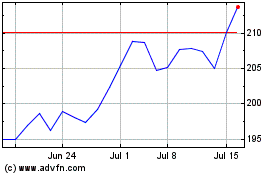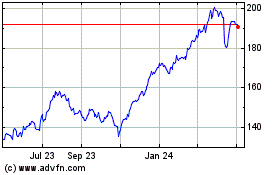By Rory Jones in Dubai and Benoit Faucon in London
Saudi Arabia's dream of becoming an investment hub in the desert
is unraveling.
JPMorgan Chase & Co. Chief Executive James Dimon, Sunday
became the latest prominent executive to back out of the kingdom's
premier business conference amid questions about the disappearance
of journalist Jamal Khashoggi. Mr. Dimon had been a featured
speaker, and his bank has longstanding ties to Saudi Arabia and is
advising it on deals.
Mr. Dimon joins a host of Western executives and advisers who
pulled out of Riyadh's conference following allegations that the
Saudi government ordered Mr. Khashoggi's killing. Ford Motor Co.
Chairman Bill Ford and Uber Technologies Inc. Chief Executive Dara
Khosrowshahi, whose company is partly owned by Saudi Arabia, won't
attend the conference.
A spokesman for the conference on Friday called the
cancellations disappointing but said the Saudis were still looking
forward to holding the conference.
Saudi Arabian stocks tumbled Sunday as investors' confidence was
shaken in the 33-year-old Crown Prince Mohammed bin Salman's
ability to deliver on pledges to attract foreign investment amid
signs Mr. Khashoggi's case could spook businesses and risked
serious damage to Saudi relations with the U.S. and other
countries.
President Donald Trump promised "severe punishment" if the
allegations about Mr. Khashoggi prove true.
The Saudi government says it had nothing to do with Mr.
Khashoggi's disappearance and is working with the Turkish
government to investigate what happened to him.
The Riyadh-based Saudi Stock Exchange's benchmark Tadawul All
Share Index closed 3.5% lower, after falling nearly 7% at one point
in the session.
Last week, as the case's repercussions came into focus, foreign
investors were net sellers of $160 million worth of shares on the
Tadawul, according to the exchanges data. That compared with net
buying of roughly the same amount in the previous week, the data
showed.
Before Mr. Khashoggi's disappearance, Prince Mohammed's most
ambitious plan, the initial public offering of the state oil
company, had stalled. Saudi talks with companies including Alphabet
Inc.'s Google, Warner Bros. and Richard Branson's space firms
haven't resulted in deals.
More broadly, Saudi finance ministry officials say the
government has created a level playing field for businesses,
supplanting an environment where deals depended on political and
royal connections. The kingdom is expecting tens of billions of
dollars in foreign cash flow from passive investors now that its
stock market has gained approval from multiple indexes.
"By any measure, progress over the past year has been positive.
New investments have been agreed at home and abroad in a number of
sectors, including entertainment, technology, infrastructure,
renewable energy and tourism," said a spokesman for the Saudi
sovereign-wealth fund.
To be sure, some Western executives are waiting before
disrupting their ties with Saudi Arabia. Some are waiting for a
signal from Treasury Secretary Steven Mnuchin, who so far remains
committed to attending the conference in Riyadh and maintaining
Saudi ties, U.S. officials said.
Credit Suisse Group AG CEO Tidjane Thiam was planning as of
Sunday to attend the Riyadh investment conference that begins Oct.
23, according to people familiar with the matter. Goldman Sachs
plans to send two top executives, Dina Powell and Sheila Patel,
other people familiar with the matter said.
A Western banking executive said bankers feared losing business
in Saudi Arabia if they don't attend the conference.
In April 2016, Prince Mohammed announced a plan to revamp his
kingdom's society and economy dubbed Vision 2030. The ruler allowed
women to drive for the first time, opened the first new cinema in
over 30 years, began construction on a futuristic new city called
Neom and promised a more moderate form of Islam.
The young leader has promised aggressive policies to further
investment, improve the workforce and create the legal and
regulatory climate to diversify and develop his country's
oil-dependent economy.
However, Saudi Arabia has had trouble sealing the types of
business deals that the prince wants.
Some of his actions have worried the business community. He has
blockaded Qatar, rounded up Saudi businessmen at the Ritz-Carlton
Hotel and severed diplomatic ties with Canada over a tweet.
Mr. Branson, the British entrepreneur, last week said he would
give up two directorships related to Saudi tourism projects over
Mr. Khashoggi's disappearance and also would suspend talks with
Saudi Arabia's sovereign-wealth fund about its proposed $1 billion
investment in his Virgin Orbit and Virgin Galactic space
ventures.
Saudi government talks with Alphabet Inc.'s Google and Amazon
Inc. to build data centers also haven't progressed to an agreement.
The projects would have helped bolster the development of the
technology sector in Saudi Arabia, a goal Prince Mohammed has
championed. Amazon and Google didn't respond to requests for
comment.
Softbank Group Corp. and Saudi Arabia are scaling down and
rethinking a solar-generation and manufacturing plan they announced
in March as the world's biggest-ever renewable project, worth $200
billion. SoftBank and Saudi Arabia both say the plan will go
forward eventually.
After the first cinema opened to great publicity this summer,
only one more has opened, and not every agreement under discussion
with U.S.-based AMC Entertainment Holding Inc. has been finalized,
people familiar with the negotiations said. In April, Saudi Arabia
and AMC promised up to 40 theaters over the next five years; only
one is operating, in Riyadh's nearly empty financial district. A
person close to the cinema talks said the theater plan was still on
track as originally conceived.
Saudi Arabia has been more successful deploying its own money
around the world, though even there its track record is mixed.
A Saudi commitment to private-equity firm Blackstone Group LP of
up to $20 billion for a U.S. infrastructure fund -- lauded by
President Donald Trump -- has gotten off to a slow start.
Blackstone raised an initial $5 billion, half of which is set to
come from the Saudis' Public Investment Fund. The infrastructure
fund has yet to announce its first deal.
Blackstone didn't immediately respond to a request for
comment.
In total, the Saudis' Public Investment Fund has invested or
committed roughly $100 billion to investments overseas in firms
such as Tesla Inc. and Uber. As the biggest contributor to
SoftBank's $100 billion Vision Fund, Saudi Arabia is among the
largest global investors in the technology industry. The Saudis
have expressed hope that those investments will encourage companies
to set up in Saudi Arabia.
A person close to the SoftBank Vision Fund said advisers are
watching closely not just for evidence of a crime in Mr.
Khashoggi's case, but also for any reactions from portfolio
companies. A question for the Vision Fund is whether deals get
derailed because of Saudi Arabia's close affiliation with the fund,
the person said.
--Jenny Strasburg and Summer Said in London and Emily Glazer in
Los Angeles and Liz Hoffman in New York contributed to this
article.
Write to Rory Jones at rory.jones@wsj.com and Benoit Faucon at
benoit.faucon@wsj.com
(END) Dow Jones Newswires
October 14, 2018 22:47 ET (02:47 GMT)
Copyright (c) 2018 Dow Jones & Company, Inc.
JP Morgan Chase (NYSE:JPM)
Historical Stock Chart
From Mar 2024 to Apr 2024

JP Morgan Chase (NYSE:JPM)
Historical Stock Chart
From Apr 2023 to Apr 2024
